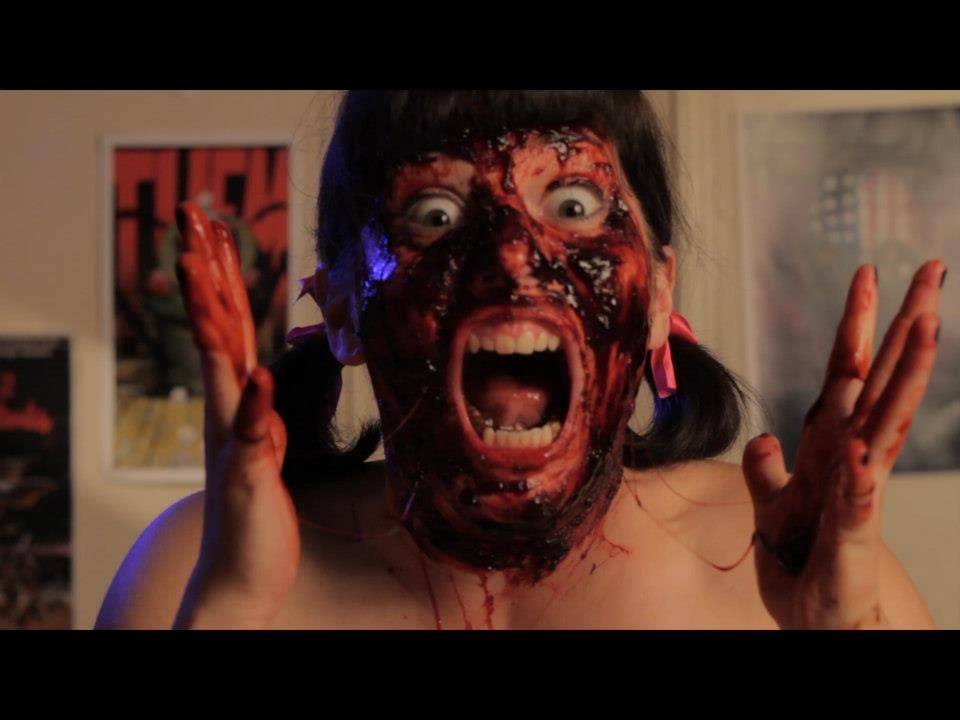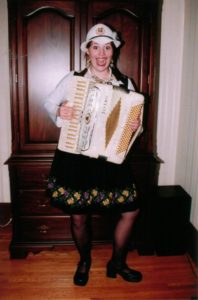
By Justin Decloux
We saved the best interview for last.
Hi! Director Justin Decloux here taking over the interviewing reigns from webmaster Emily Milling – who along with building this entire site was also the producer/scheduler/caterer/special effects artist/actress/sound designer/composer and a million other thing on IMPOSSIBLE HORROR. She would wake up, go to work for eight hours as a marketer, come home at six, and spend the rest of her night working on the film during shooting and then for the last eight months of post production!
I love Emily with all my heart and there is no way the project could have been completed without her hard work. She is one of the most multi-talented people I know and I thank the elder gods every day that I’m able to have her in my life.
Sheesh! Enough with the mushy stuff! Lets get to the her talking about how bloody difficult the project was to fight through! If you have your own questions about the film, get your tickets for the world premiere of Impossible Horror on Monday, October 16 at 9:30 p.m. at the Scotiabank Cinema to see the film and meet the cast & crew at the Q & A after the screening!
J: Did you get enough sleep last night?
E: No. I could use significantly more sleep!
J: I’m looking at the credits and did you actually do ALL OF THAT on those roles on the film!?
E: Yes. Producer, composer, sound design/mixing/foley, transportation, craft services, makeup and effects… you know, the stuff that needs to get done to make a film! But as a producer I was happy to take on the other random things even if I had no idea what I was doing. I did however, elect to do the sound myself which I’m kicking myself for now – I had no idea how difficult that would be. But maybe that’s the beauty of naïvety, when you don’t know what the hell is going on and you don’t know how long it will take, it’s a lot easier to keep plugging away until you do!
J: That’s crazy. What was the most difficult part of shooting?
E: Trying to make special effects, I think. I’m a perfectionist and I really like things to look slick but I’m not trained in effects at all so I had to rely on a lot of internet tutorials, most times, the day of the shoot when they’d be happening. There was a throat slit scene that ended up being cut (HA! PUN!) because I made the actor’s neck look like a pile of bloody toilet paper. I’m sure she loved that. It was also difficult to shoot midnights, of course, but when you’re running on pure adrenaline to get shit done, it gets easier. I also love to have everything planned down to the minute and I learned very quickly to be flexible with that, but it was a tough thing to move through.
J: What was the part you enjoyed the most?
E: Working with YOU! I think I liked pre-production the most because it involves so much planning and organization which I love, and I can be idealistic about how things will turn out. Then in productions my organizational dreams crash to the depths of hell, and in post I can ride everything out and accept that all the planning was actually really worthwhile. I also really enjoyed working with the tight-knit team, honestly
Haley and
Cree made the process so much easier just by being so professional and upbeat!
April continued to inspire me throughout the process with her “get it done!” attitude and gave me honest feedback when I needed it most, and
Nate and
Aidan were always supportive and hardworking throughout the process.
J: How did you approach the task of writing the music?

E: I spent a lot of time listening to a lot of music and tried to develop a sonic landscape to build from. I made a
playlist to inspire me! Lots of Tangerine Dream, the soundtrack for Stranger Things (obviously, because that’s what everyone’s going to be drawing inspiration from right now), Cliff Martinez, Mark Korven, John Carpenter – you know the drill. I’m always bummed when I look at that list and realize there are no women on it.
Back to process. When I get overwhelmed by giant tasks (like writing 18 cues that need to connect and bridge scenes and emotions together) I tend to look at a lot of different types of sounds and download way too many free plugins so that I can listen to all the presets and pretend I’m working really hard and being productive. In the end I forced myself to pick a few instruments I really liked, and I built out themes from there.
One thing I’m really happy with is this concept of sparse drumming that was inspired by
Mark Korven’s The Witch OST. He’s got this
crazy cool instrument he had custom built to make all the super neat organic sounds you can hear in those pieces, as well as a waterphone (someone please buy me one!) and all I had to use was my computer and a couple of pencils I whacked against my desk a lot. I love listening back to the unaffected pencils, or “sticks” as we affectionally call them in the Milling/Decloux household and just how terrible I am with rhythm, and how I was able to use the magic of technology to make them sound like this weird ethereal and suspenseful glue that tied everything together.
J: How do you make the cues feel like they’re all part of a whole?
E: I listened back to my music a lot in the car on the way to work every single day. Any time I’d write a new piece, I’d listen through to all of the tracks together as though I was trying to build an album. Hearing the nuances I’d placed in each track helped guide themes in other pieces. Little riffs here and there with a particular synth sound I liked would reappear later as the main driving theme in later tracks, and vice versa as I moved through the film. Keeping a set list of the instruments I wanted to use really helped as well – because man you can go down wormholes of free VSTs until the cows come home. WOO!
J: How do you find inspiration for sound design?
E: I was pretty lucky that the new Twin Peaks came out RIGHT as I was getting into it. I had finished all the foley and finding the majority of sound effects at that point, and couldn’t figure out why things felt so sparse and incomplete. Then episode 8 of Twin Peaks season 3 came out and I was like OH YEAH I GET IT NOW! I also re-watched Eraserhead here and there to understand David Lynch’s brain a bit better, and how he found those sounds.
I have this memory of being a really angsty teenager on a trip to Newfoundland with my grandparents in about grade 10, and we were on the ferry crossing over to the island. My brain was going a zillion miles an hour (hooray for undiagnosed ADHD!) and the sound the ferry was making was so overwhelming and all encompassing, it was this huge engine sound, a droning sound, and it reverberated all over the ship so I could feel it everywhere. That sound calmed me down a lot and I always thought “I wish I could just hear this and be calm all the time,” and that feeling drove a lot of the more intense scenes, like towards the end when Hannah and Lily are in the parking garage. I recorded the giant sound reverberating all over the parking garage in our building (where we shot the film) and added in a bit of a wavering bass sound using an LFO in Ableton to achieve that. I guess it’s a little weird that I went in the opposite direction, using calming sounds to create intense feelings, but I think it worked in my favour!
J: What was the toughest sound to get?
E: Creating the cacophony of sounds in the playground when Hannah and Lily find the saxophone and they’re confronted by the mysterious hoodie figures was ridiculously difficult. I literally hated it. And I still hate it. But I’m told it’s fine so I’m going to just leave it at that!
J: How does it feel that the project is almost over?
E: It is?!?!?! I feel so great. I’m so exhausted but I seriously feel so great. I’m so proud of the work that everyone put in, and I’m proud of the work that I put in too. I lived for a long time not making films, being intimidated by it even though it’s all I want to do, and being able to pour myself into this project drew it out of me. I feel way more confident about my capabilities as a filmmaker, being on set taught me a lot and pushed my boundaries a lot, taught me to not be so afraid. I talk to other women in film/media and I hear my own story echoed all the time, we’re always getting shut down & losing confidence. That’s really shitty. I’m glad I had the opportunity to grow in this art in a really productive, supportive environment with you and the team, I’d do it over again in a heartbeat! I hope that from this I can take my confidence and help champion the other amazing women in film in Toronto!
J: What would do differently next time?
E: So many things! But that’s just because I learned how to do almost all of this along the way. I would definitely work with a bigger budget next time to allow for a bigger team, we really did a lot with next to no budget which just meant that you and I (and everyone on set) filled a lot of different roles. I’d like to have the money to hire more people next time, so that we can stick to creative vision and process with a great team to help support execution.
J: I look forward to seeing your next project!
E: And I look forward to seeing yours!

